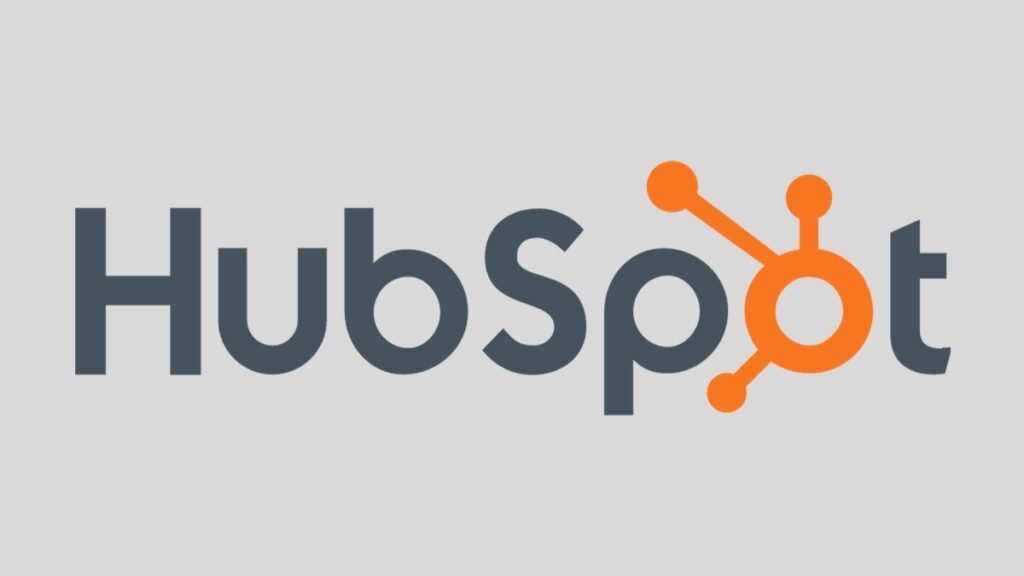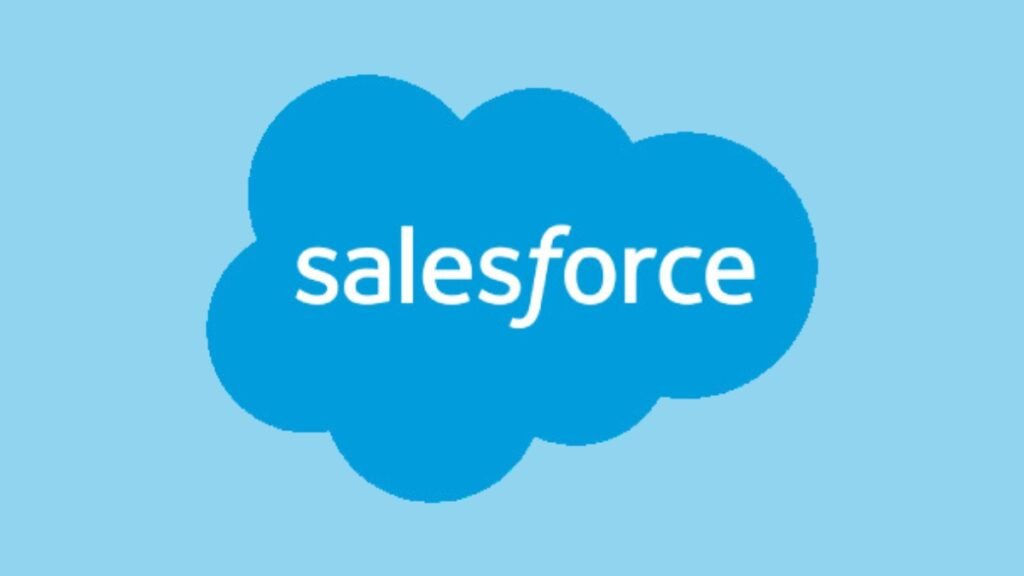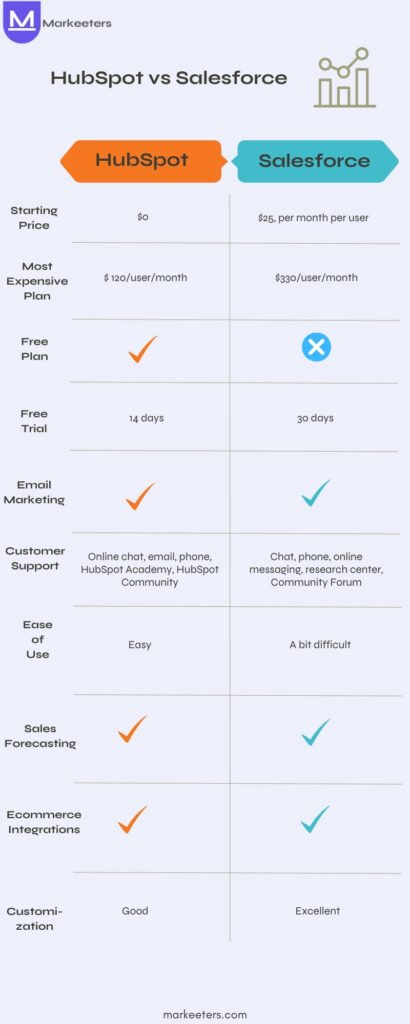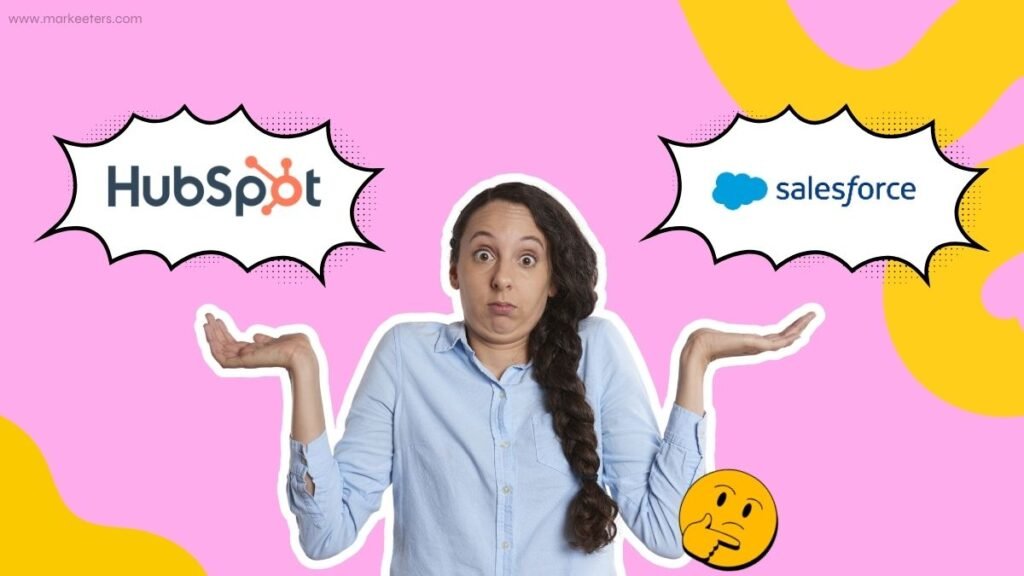Simplify your choice with our detailed analysis HubSpot vs Salesforce. Discover the best fit for your business needs. Make informed decisions today!
Your marketing team is tired of using spreadsheets to manage campaigns; your sales team is fed up with manually tracking funnels; and your customer success team is managing every support ticket by hand. Sounds familiar? You are in need of a CRM platform, but you are unsure about your options. HubSpot and Salesforce are the most widely used solutions available. Let’s figure out which one is best for your business.
If you are in search of a CRM platform, HubSpot and Salesforce both have a lot to offer. They both provide features that may help you manage relationships with customers, automate marketing procedures, and coordinate projects, to mention a few.
In this blog, you will learn:
- What is CRM Software?
- What is HubSpot CRM?
- What is Salesforce CRM?
- HubSpot vs Salesforce: A Quick and Detailed Review
Let’s begin!
What is CRM Software?
A CRM, or Customer Relationship Management software, is a technological tool for maintaining all of your business’s contacts and relationships with present and future customers. The objective is straightforward: strengthen commercial ties. In simple terms, to improve and maintain business relationships. CRM systems allows businesses to increase profitability, streamline operations, and maintain customer relationships.
It is estimated that the global CRM market’s value will grow by over 245% by 2028.
When there is a discussion about CRM, it often means a platform or CRM system, which is a tool that aids in productivity, sales management, contact management, and other aspects. CRM software assists you in concentrating on the relationships that your company has with specific individuals, such as customers, employees, suppliers, or service users, over the course of your working relationship. This includes acquiring new customers, developing their business, and offering ongoing support and other services.
What is HubSpot CRM?
HubSpot CRM is a customer relationship management platform known for its strong capabilities that help businesses build close relationships with their customers, increase conversations, and generate revenue based on several interaction channels. It is available for free. HubSpot CRM is an essential component of the HubSpot ecosystem, which smoothly combines services, marketing, and sales features.
Core Features
| Common Features | Features for Marketers | Features for Salespeople |
|---|---|---|
| – Contact and Company Insights – Gmail and Outlook Integration – Tasks – Contact Management – Companies – Deals | – Lead Analytics Dashboard – Contact Activity – Forms | – Email Templates – Email Scheduling – Email Tracking – Calling – Meetings – Documents |

Pros and Cons
Pros
- Strong marketing and sales automation
- Integrated Content Management System (CMS)
- Scalable, flexible, agile
- All-in-one platform
Cons
- Expensive for small-sized businesses
- Challenging to utilize as a single tool
- Difficult to edit templates
- Limited reporting
Learn more with Markeeters:
- 10 Word-of-Mouth Marketing Strategies to Grow Your Business
- What is Word-of-Mouth Marketing? Definition and Guide
What is Salesforce CRM?
Salesforce CRM is a cloud-based software provider that gives companies the tools they need to identify more prospects, complete more transactions, and give their customers better services. CRM services are offered by well-established US cloud-based software provider Salesforce, Inc. Salesforce is a well-recognized CRM solution for sales support, and marketing teams globally.
With the help of Salesforce, businesses can use cloud computing to improve relationships with their present and future customers. Businesses can track customer behavior, advertise to customers, and perform a host of other functions with the Salesforce CRM.

Core Features
- Lead and contact management
- Sales opportunity management
- Customer reports and dashboards
Pros and Cons
Pros
- Time management
- Increased revenue
- Customer satisfaction improved
- Organized data and reporting system
- Customizable options
Cons
- Expensive pricing plans
- Takes time to produce results
- Challenging process to set up your business
- Additional costs to get the platform set up
HubSpot vs Salesforce: A Quick Review
| Feature | HubSpot CRM | Salesforce CRM |
|---|---|---|
| Pricing | Affordable plans for businesses | Scalable pricing for enterprises |
| User Interface | Intuitive and user-friendly | Highly customizable but steeper learning curve |
| Integration | Effortless integration with HubSpot marketing tools | Extensive third-party integrations |
| Automation | Strong automation features | Advanced workflow automation capabilities |
| Scalability | Suitable for small to medium-sized businesses | Ideal for small to large enterprises |
| Lead Management | Streamlined lead nurturing process | Extensive lead management tools |
| Customer Support | Excellent customer support with various support channels | Extensive support options and community |
| Mobile App | User-friendly mobile app | Feature-rich mobile application |
| Analytics and Reporting | Basic analytics and reporting | Advanced analytics and reporting tools |
| Customization | Limited customization options | Highly customizable to meet specific needs |
| AI and Machine Learning | Limited AI features | Advanced AI and machine learning features |

Download our Free e-books:
HubSpot vs Salesforce: A Detailed Comparison
HubSpot vs Salesforce: Reporting & Analytics
| HubSpot |
|---|
| – HubSpot helps you in saving time, maximize your ad budget, and concentrate on important, qualified leads. – HubSpot’s attribution reports assist you in identifying your most productive channels and reallocating your advertising budget. – You can get detailed information on website traffic and sales that resulted from your campaigns. You can also determine the point in the online customer experience where you are losing leads and address the issue accordingly. |
| Salesforce |
|---|
| – Salesforce makes it simple to get insights that can be put into practice and improve overall business performance. – You can make changes to its visual dashboards so that team members and managers can see in real-time whether the KPIs and other objectives are achieved or not. – Einstein’s AI tool analyzes sentiments accurately and makes close predictions. It can provide managers access to real-time data analytics and give front-line employees advice for focused improvements. |
Winner: Salesforce wins in this area because of its extensive toolkit and eye-catching dashboards. The AI-powered Einstein tool’s predictive analytics and decision-making assistance add real value. But HubSpot also has strong reporting and analytics features, perhaps sufficient for the majority of SMBs.
HubSpot vs Salesforce: Email Marketing
| HubSpot |
|---|
| – The HubSpot platform allows you to design, customize, and maximize email marketing campaigns. HubSpot with its free plan, permits 2,000 promotional emails each month. – HubSpot has a simple drag-and-drop email design application and adjustable templates. It just takes a few minutes to create customized emails with clear call-to-action (CTA) choices. – A/B testing tool allows you to send two different email designs and compare their performance. You can improve your email marketing efforts with the help of this tool. – The HubSpot has an amazing AI technology that lets you produce customized emails for each individual or company in a campaign’s segmented group. |
| Salesforce |
|---|
| – All plans in Salesforce allow you to send 5,000 email marketing messages per day via the platform. – To manage regular emails and incoming responses to email campaigns more effectively, link Salesforce with well-known email providers like Gmail and Outlook. – Salesforce has an extensive collection of appealing themes. They provide professional-looking results while making email design quick and simple. |
Winner: HubSpot is the clear winner in this one. HubSpot’s email marketing technology is integrated right into the platform, unlike Salesforce. Its easy-to-use features facilitate the rapid and simple creation and implementation of campaigns. HubSpot has more features than Salesforce.
HubSpot vs Salesforce: Contact Management
| HubSpot |
|---|
| – Leads can be gathered through a variety of sources, such as mobile devices, live online chats, and website forms. The information is automatically entered into a database for future reference. – HubSpot’s active lists are updated automatically to indicate which contacts may be interested in hearing from you. It keeps track of functions you designate, like clicking on a link in an email. If prospects don’t carry out specific activities within a given time window, HubSpot removes them from the database. – The ability to divide customers and prospects is based on their psychographics, demographics, and previous interactions. It helps create contact groups with members who share similar characteristics to get exclusive deals. |
| Salesforce |
|---|
| – Objects are spreadsheet fields that give additional context to customer and prospect data (e.g., name, contact email, last purchase date). Salesforce allows you to create additional, distinct customer fields for monitoring and analysis. – As a transaction moves through the sales funnel, it helps keep an eye on its stage, projected value, and likelihood of success. – It only shows the information team members need to view in order to do their duties. This protection keeps your company safe from data breaches and enables you to comply with the CCPA and GDPR. |
Winner: Salesforce provides great object control and customization. HubSpot has dynamic lead management and capture features. HubSpot’s smart active lists function, which saves time by identifying contacts who might be ready to buy soon, is another feature that is well liked.
HubSpot vs Salesforce: Workflows and Automation
| HubSpot |
|---|
| – HubSpot automated workflow development feature is flexible. For instance, you can program email replies to customers and schedule phone reminders. Automations increase customer management and simplify the sales process. – HubSpot has a user-friendly drag-and-drop visual editor for creating unique process automations. Create your service and sales procedures without knowing any code. – HubSpot’s lead score system is a helpful feature. HubSpot prioritizes the most viable leads by assigning a score based on the attributes you select. |
| Salesforce |
|---|
| – Salesforce allows you to convert new fields and objects into processes when you add them to a database. For instance, you might mandate that your representative collect certain information from a fresh lead that enters the system before advancing the prospect to the next stage of the sales funnel. – Salesforce simplifies operations to improve team and task management. To meet your company’s needs, add new procedures or modify the current one. – Salesforce with the help of its AI-integrated Process Builder, makes recommendations for new and more effective workflows. Even though Process Builder is limited to enterprise service plans and higher, the process of developing new processes is generally simple on all fronts. |
Winner: Salesforce offers accurate and adaptable automation and workflow features. Teams, marketing campaign frameworks, and a lot more can be managed skillfully. The Process Builder tool on the platform is excellent. While HubSpot’s visual editors are easier to use, Salesforce’s advanced automation features are not available on the platform.
HubSpot vs Salesforce: Conclusion
Both HubSpot and Salesforce are outstanding generic CRM systems. We suggest both systems to businesses with the following particular requirements:
Businesses looking to Increase their Sales and Marketing Efforts should use HubSpot
HubSpot offers plenty of useful features that will assist you if your objective is to increase lead generation and sales. Its extensive sales forecasting features, omnichannel capabilities, active lists, integrated email marketing platform, and market segmentation tools will soon make it vital. The Professional bundle is reasonably priced considering the versatility of the platform. You can, however, use the free plan to discover if HubSpot is right for you.
Salesforce is the Greatest option for Businesses seeking a Highly Personalized CRM
Salesforce has an abundance of features and is easy to use. This platform can handle ever-increasing operational complexity on your behalf as your organization expands. Salesforce is an effective tool that can be used to develop workflows that increase productivity and generate unique databases with the exact information you need. API features and app store improve customization and usefulness. Although Salesforce is not expensive, its features, usability, and adaptability make it an appropriate investment.
FAQs
Is HubSpot or Salesforce better?
HubSpot features an integrated email marketing platform and is simpler to use. Businesses looking to increase sales and marketing activities find its reporting and analytics capabilities appealing. Salesforce is easier to integrate with other company applications, has superior reporting and analytics capabilities, and has more customization choices. Salesforce is a more suitable option for businesses looking to improve every facet of their customer-facing operations.
Is Salesforce free to use?
Since Salesforce does not have a free forever plan, using the platform for a lengthy amount of time would require a minimum monthly payment of $25 per user. Nonetheless, Salesforce provides a 30-day free trial, which should be enough to allow you to test the program before committing.





